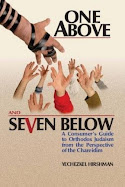The first and most important point is that despite all the hype I make about chareidim - such as "The Chareidi Response"; "Every thing you always wanted to ASK about the Chareidim"; in the FAQ section: "chareidi Judaism"; and especially in the opening of Chapter 1 "This book is about chareidim..." - despite all that... this book is NOT about chareidim!!!
This book is about Orthodox Jews!
It is merely how we folks who call ourselves chareidi define all Orthodox Jews. The main principles were all summarized on page 217 but here they are again - now the trick is to replace the original word "chareidi" with the term "Orthodox Jew". Okay, I'll do it for you:
- [A chareidi] {An Orthodox Jew} is one who buys into G‑d the Father’s contractual deal (heretofore: policy) as stated in Leviticus 26:3 in accordance to Rashi’s commentary adapted from Torat Kohanim which stipulates that our side of the deal involves performing the commandments with “toil in Torah”.
- Toil in Torah does not mean that every Jew must drop everything and dedicate his life to nothing but Torah study. Toil in Torah means that every Jew should continue doing what he does best with the aspiration of creating a society that functions along the guidelines of the laws of the Torah as well as do whatever he can to increase the knowledge of the laws and philosophies of the Torah among all the members of this society and, subsequently, among all of mankind. This latter aspect ideally entails some level of personal study and, at the very least, full scale support – moral and financial – of those who can study more intensely.
- Man’s ultimate purpose is to come as close to G‑d as he can. This is accomplished by emulating His traits (from Mesillas Yesharim and others).
- The very minimum implementation requirement to be [chareidi] {an Orthodox Jew} – in conjunction with the ideological adherence to [chareidi] {Orthodox Jewish} principles[1] - is to observe the commandments at their most basic level (Asseh Tov), not to wantonly violate any negative commandments (Sur Merah) and to recite Kriat Shema twice a day[2] (and mean it).
- (Note -This is not on page 217 but I am adding it here) - Every thing that one does is either a mitzva (Anochi Hashem) or a transgression (Lo Yihiyeh Lecha). There is nothing that is neutral (see earlier post on Xenophobia).
- Every Jew is invited to the party - Black tie (and suit and hat and velvet kipa) optional.
The ideology that I am trying to promote throughout this entire project is the ideology of Torah, pure and simple, the way it would be presented by Rashi himself were we to be sitting at his feet 900 years ago.[3] I do not seek to add to it nor to subtract from it. In a nutshell, it is what we Ashkenazim call Yiddishkeit {Orthodox Judaism}. Ideally, it would follow that the best term for the followers of this discipline would be, well - Yidden {i.e., Orthodox Jews}!
[1] These would be the concepts that were covered in Chapter 7 – Maimonides Thirteen Principles of Faith, Pirkei Avot, Messilat Yesharim and Chovot HaLevavot.
[2] See Kitzur Shulchan Aruch 45:23
[3] Moreover, I am not promoting any particular subjective understanding of the verse or of Rashi’s position. If the reader sincerely maintains an interpretation of the Torat Kohanim that differs with mine, then I urge him to follow his own viewpoint.
Any Questions-- just ASK...
Yechezkel






2 comments:
what was wrong with calling them chareidim? chareidim you defined not as the media type chareidm-but rather as the anxious to listen type-so those are the people interested in doing and actually doing all the stuff in this blog....whereas plenty of modern orthodox people don't do any of the things you said here so its not completely true-even if thats what hashem wants from them but thats not what they are actually doing-so why did you switch?...if you have an answer plz email me at onlylishma@gmail.com
I do not really understand your question.
YH
Post a Comment